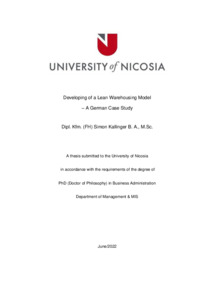- Kallinger, Simon
- School of Business
- Department of Management
- 2022
- English
- 419 pages
- Kaufmann, Hans-Ruediger | Kokkinaki, Angelika | Chandresakhar, Natarajan
- Lean thinking | Lean warehousing | Lean logistics | Lean leadership | Warehouse management system | Logistics 4,0 | Smart factory | Warehouse excellence
- Business Administration -- Management and MIS
-
-
Representing a crucial research gap Lean Warehousing (LW) is often understood as a toolbox rather than a strategic alignment and a philosophy. Therefore, the implementation of LW has systemic flaws due to the lack of philosophy understanding, transformational leadership, and change management, as well as, so far, not considered factors in Warehouse Management. To better understand sustainable Lean Warehousing transformation, it is necessary to synthesise knowledge of these theories.
This research aims to examine why most of the attempts to implement LW fail and why the current theories of LW do not suffice. As a result, there is a need to develop a comprehensible LW model.
The study started with a narrative literature review gathering data about Warehouse Management, Lean Warehousing methods, the standard functions of Warehouse Management Systems (WMS), corporate philosophy and culture, change management, and leadership to identify the scientific gaps and factors for a viable LW model. The results were then synthesised by an initial conceptualisation and research hypotheses to be validated by empirical research. This research approach pursues the quantitative survey and qualitative case methods to triangulate the research results. This combines the respective advantages of both methodologies and will lead to higher levels of reliability and validity. Therefore, this approach is considered conducive to developing new knowledge in the field as former studies either used case studies or quantitative surveys and not both. The study shows a robust correlation between the Lean Warehousing Maturity Index (LWMI) and the automation grade, which indicates that automation and Lean Philosophy do not exclude each other. Furthermore, the results from the survey with managers from the qualitative survey with those from the quantitative survey show substantial differences regarding the role of leadership and culture. So, on the one hand, the findings of this study confirm the literature which describes that general problems of LW implementations are based on soft skills like corporate vision, strategy, culture, and leadership and, on the other hand, elicited innovative factors (hard skills) like automation and warehouse software, which have a significant influence on LW.
-
Developing of a Lean Warehousing Model – A German Case Study
Main Files
 Full text
Full text
Description: 220614_Kallinger_PhD_Thesis_Developing of a Lean Warehousing Model_revised_clear.pdf (pdf) Book Reader
Size: 4.0 MB
| Type | Location | Link |
|---|---|---|
| dissertation | [More information] |

